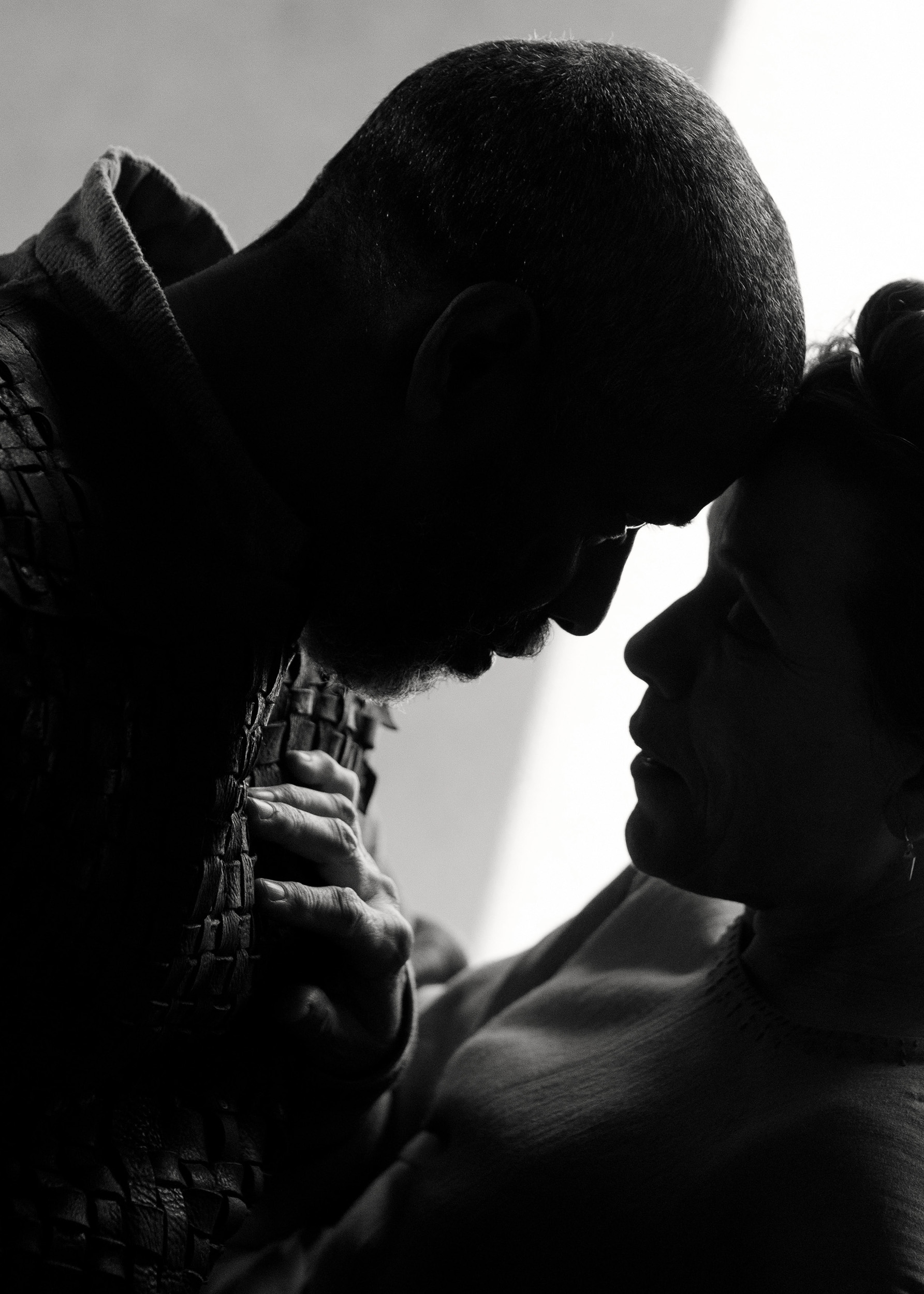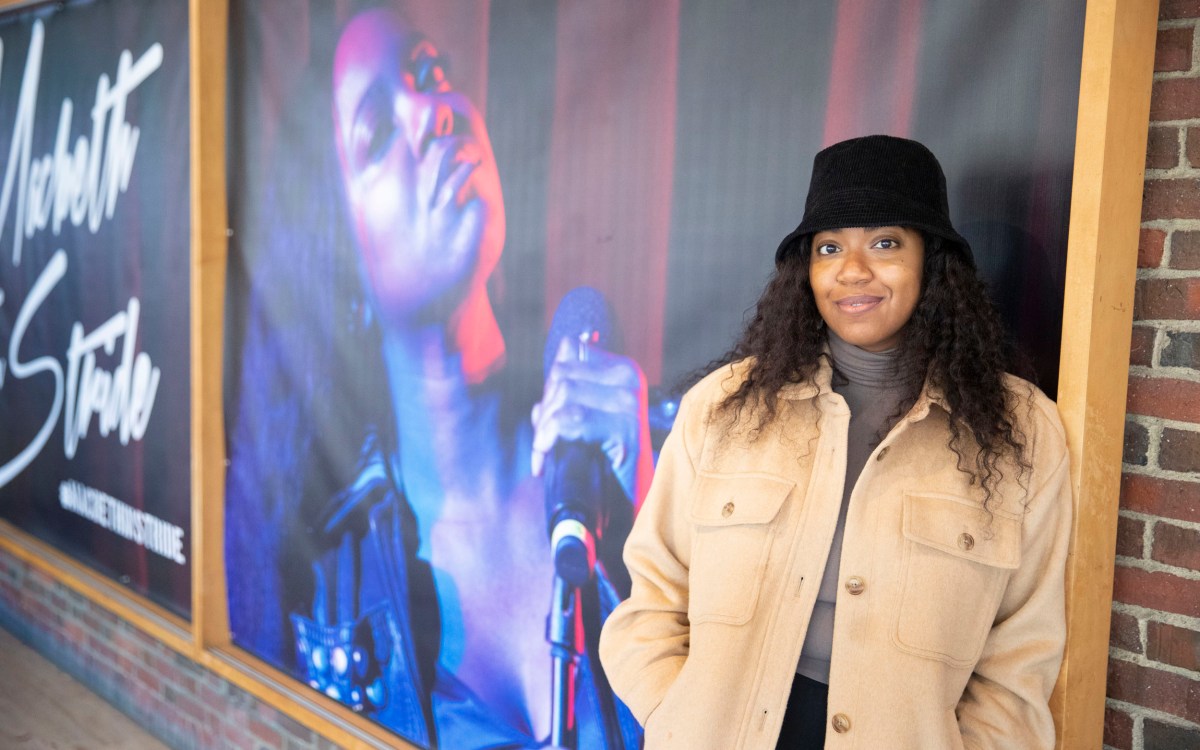Film full of sound and fury in dark pandemic season
Harvard scholar weighs in on Joel Coen’s new adaptation of ‘Macbeth’ with Denzel Washington, Frances McDormand

Denzel Washington and Frances McDormand in “The Tragedy of Macbeth.”
© Apple TV+
Director Joel Coen takes on Shakespeare with his latest film “The Tragedy of Macbeth.” Shot in black and white, with sparse sets, dramatic lighting, and a stellar cast featuring Denzel Washington and Frances McDormand, Coen’s interpretation lends the 400-year-old story about murderous ambition both a theatrical feel and a modern twist. The Gazette spoke with Jeffrey Wilson, who teaches “Why Shakespeare?” to first-year students in the Harvard College Writing Program, about Coen’s adaptation and the lasting resonance of the play. This interview was edited for clarity and length.
Q&A
Jeffrey Wilson
GAZETTE: “Macbeth” has been adapted to film a number of times. Is there anything about this particular version that really makes it stand out?
WILSON: Kathryn Hunter as a Weird Sister holding up a severed thumb between her toes — didn’t see that coming.
You’ve got Denzel Washington, and Denzel can do no wrong. As a person, as an actor, he exudes charisma and nobility, and he commands respect and attention. And that’s really important, because at the start of the film those feelings we have toward the actor spill over into the way that we feel about the character. It gets us enamored with Macbeth at the start of the Coen film. And that’s a really effective way to approach the play.

I also think the film is kind of remarkable for what it doesn’t do. When you have Denzel Washington and Frances McDormand, you just sort of hit record and then get out of the way. That’s really in contrast to so many Shakespearean adaptations where they want to do something that is new and unexpected, and updated. Sometimes that works and sometimes that comes off as gimmicky. But this is really a sparse film. There’s almost nothing on the sets. I thought about the Macbeths’ house as a mid-century modern medieval castle. The sets are cold and emphasize this feeling of isolation, and the lighting, which is one of the stars of the show, is extremely theatrical.
GAZETTE: Macbeth is a brutal killer, but he is also consumed by guilt and uncertainty. Does that conflict make him in any way a sympathetic character?
WILSON: Macbeth is not an admirable person. I don’t see “Macbeth” as a particularly relatable story. Like, who among us hasn’t ordered the murder of your best friend’s child based on the supernatural soliciting of three mysterious women? So, it’s this extremely alien story. But then you bring in Denzel. He’s really what you need for Macbeth, because at its core it’s a story about the quest for self-determination when society says to stay put. Yes, it’s about a medieval Scottish nobleman and his wife who assassinate their king, and then they themselves are deposed by a new king. But it weirdly feels like an American story. Here’s a guy who thought he was going to get a promotion, and he didn’t get the job. And then he has to go home and tell his wife about it. And then they just sort of devolve into toxic masculinity and a dysfunctional marriage.
It’s American in the sense that Macbeth thinks he lives in a world where he controls his own destiny. And that’s the message that his world has sent to him. But then there are these structural limitations on what he can actually do. And that feels American. We talk about the American Dream, but then opportunities are not distributed freely to everyone. There are traditions of hereditary privilege. And that’s the world that Macbeth comes up against. And so, getting this quintessentially American actor, Denzel Washington, who has played this role of the defiant individual up against the system so many times, to then do “Macbeth” is a really fascinating overlap between these two very, very different time periods.
GAZETTE: Is there something in “Macbeth” that gives it lasting resonance?
WILSON: “Macbeth” is about “vaulting ambition.” That’s his line. And that’s a very modern story, even though it’s this notionally medieval Scottish situation that feels very far away and very, very foreign to us. To me, “Macbeth” feels relatable. But that’s not a good thing. When Shakespeare, who lived 400 years ago feels relatable, it’s not a sign of Shakespeare’s genius, but of how little progress we’ve made as a society.
GAZETTE: What was your impression of how the film used the language?
WILSON: As I said, the sets are really plain by design. There’s not a lot of decoration. And that really throws attention onto the language. Usually, it’s not a good thing when a film feels theatrical; typically, that doesn’t transfer well. But this version feels like Laurence Olivier’s Shakespeare films, which brought theater sets onto film sound stages. Here you’re watching a film, but it feels like you’re watching theater. And there’s that sort of deliberate artificiality to it. I think Coen probably had Olivier in mind when filming because he simplifies the visual palate of the film and throws all the attention on the language and the delivery of the language.
GAZETTE: You’ve said the value of Shakespeare is not in the glory of his words, but in the conversations the plays spark. Can you say more about that?
WILSON: The value of Shakespeare comes in the conversations that follow but also in the silences that follow, where we sit and think. I think that second scenario will be going on a little bit more here as we are watching this during a pandemic. For instance, the show starts with the line, “When shall we three meet again?” You can’t help but think that line lands differently when you haven’t seen some of your friends and family for two years. Most of us are not in a theater with 300 other people. We’re watching this on Apple TV in our own homes. It’s not a communal social, artistic event; it’s a very solitary one. I think, as much as the conversations that follow from “Macbeth,” there are going to be the moments of reflection where you just sit with yourself and think some things through.
“Macbeth” is really a play about the darkness. And a lot of people have had some dark experiences in the past couple of years. “Macbeth” gives you license to go there and to think some of those thoughts that we’ve been stifling, because we want to keep a happy shine on things and stay motivated to move things forward. “Ted Lasso” is great, but for those two hours of “Macbeth,” you can lean into the danger and the trouble and the difficulty of the world.







